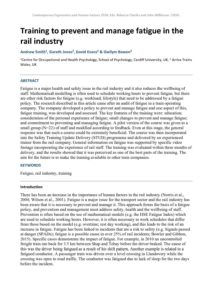| Document | Author Andrew Smith, Gareth Jones, David Evans & Gwilym Bowen |
| Abstract Fatigue is a major health and safety issue in the rail industry and it also reduces the wellbeing of staff. Mathematical modelling is often used to schedule working hours to prevent fatigue, but there are other risk factors for fatigue (e.g. workload; lifestyle) that need to be addressed by a fatigue policy. The research described in this article came after an audit of fatigue in a train operating company. The company developed a policy to prevent and manage fatigue and one aspect of this, fatigue training, was developed and assessed. The key features of the training were: education; consideration of the personal experience of fatigue; small changes to prevent and manage fatigue; and commitment to preventing and managing fatigue. A pilot version of the course was given to a small group (N=22) of staff and modified according to feedback. Even at this stage, the general response was that such a course could be extremely beneficial. The course was then incorporated into the Safety Training Update Delivery (STUD) programme and delivered by an experienced trainer from the rail company. General information on fatigue was supported by specific video footage incorporating the experience of rail staff. The training was evaluated within three months of delivery, and the results showed that it was perceived as one of the best parts of the training. The aim for the future is to make the training available to other train companies. |

